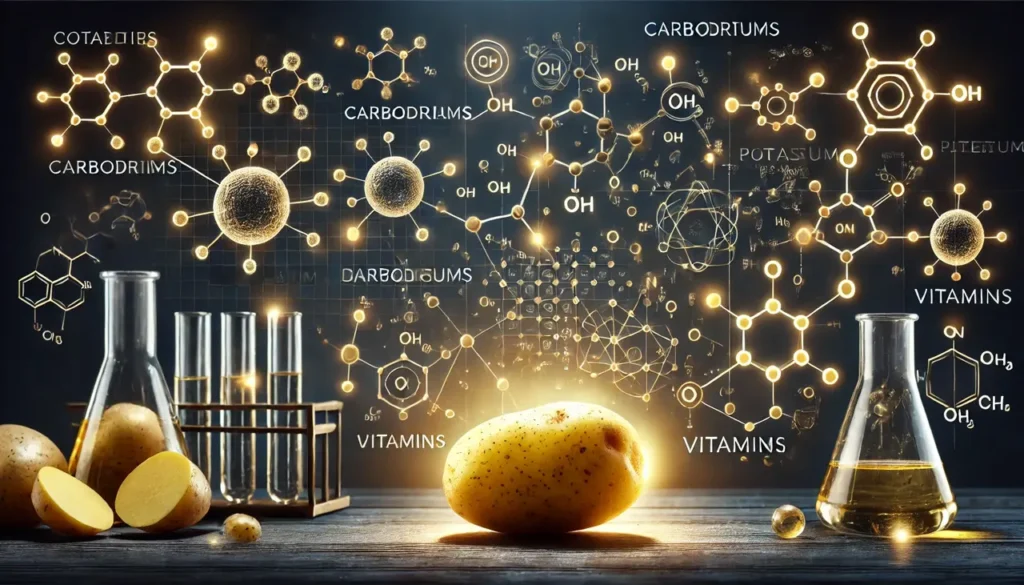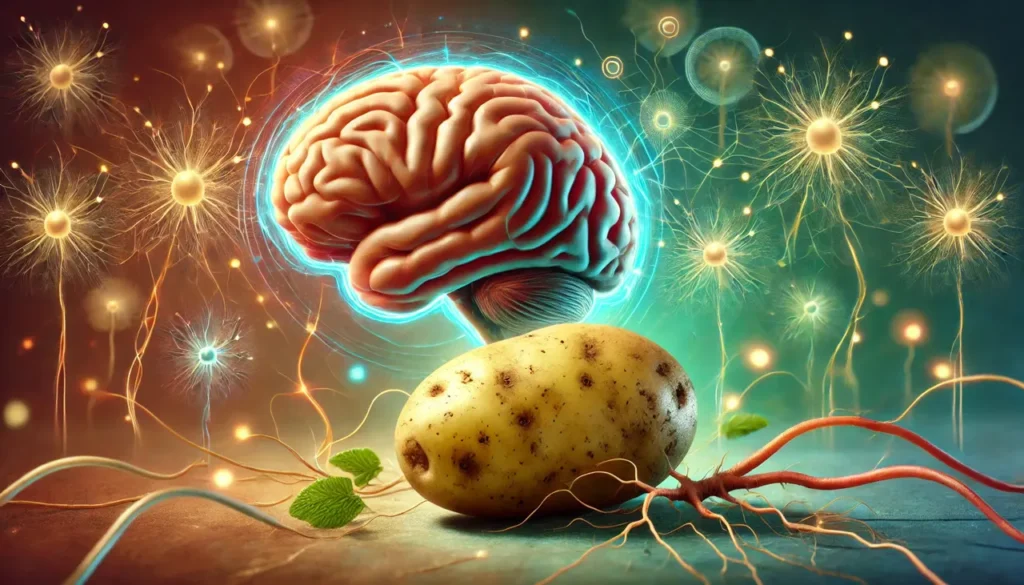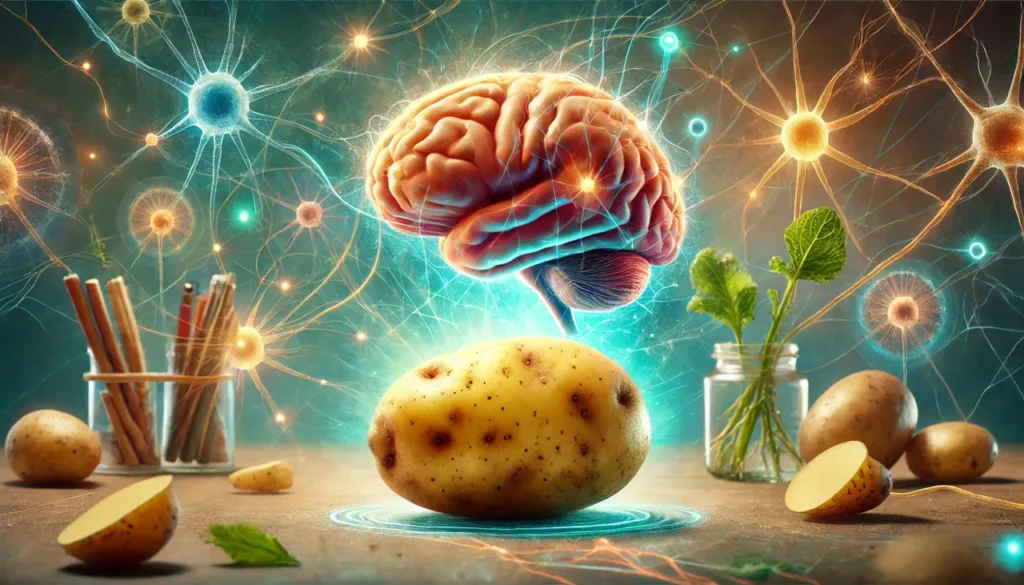Potatoes, scientifically known as Solanum tuberosum, are one of the most widely consumed staple foods globally, rich in carbohydrates, vitamins, and minerals. They are particularly recognized for their high content of potassium, vitamin C, and several B vitamins, which contribute to their nutritional profile. Potatoes have increasingly garnered attention for their potential cognitive benefits, particularly when consumed in specific forms or preparations. This article provides a comprehensive analysis of potatoes, exploring their chemistry, physiological mechanisms, potential nootropic benefits, dosing guidelines, side effects, interactions with other supplements and medications, and other essential considerations for safe supplementation.
You May Also Like:
Sources of Potatoes
Potatoes are a versatile and easily accessible food source. They are grown in numerous regions worldwide, with key producers including China, India, Russia, and the United States. Potatoes come in various types, each offering unique flavors and textures, such as russet, red, yellow, and purple varieties. The nutritional content can vary among different types, but all provide essential nutrients that support overall health.
Nutritional Composition of Potatoes
- Carbohydrates: Potatoes are primarily composed of carbohydrates, particularly starch, which serves as a significant energy source for the body.
- Vitamins: Potatoes are an excellent source of vitamin C, important for immune function and skin health. They also contain various B vitamins, including B6, which is crucial for brain health and neurotransmitter synthesis.
- Minerals: Rich in potassium, potatoes help regulate fluid balance, muscle contractions, and nerve signals. They also provide magnesium, phosphorus, and small amounts of iron and zinc.
While most individuals can meet their daily nutritional needs through a balanced diet that includes potatoes, those looking for specific cognitive enhancements may consider targeted supplementation or specific cooking methods to maximize these benefits.
Fuel Your Active Lifestyle with Potatoes’ Essential Nutrients—Order Today on Amazon!

Chemistry of Potatoes
The primary bioactive compounds in potatoes that may contribute to their nootropic potential include resistant starch, phenolic compounds, and glycoalkaloids.
Resistant Starch
Resistant starch is a type of carbohydrate that resists digestion in the small intestine and ferments in the colon, acting similarly to soluble fiber. It promotes gut health by serving as a substrate for beneficial gut bacteria, leading to the production of short-chain fatty acids (SCFAs) like butyrate, which has been shown to have neuroprotective effects.
Phenolic Compounds
Potatoes, particularly those with colored skins, are rich in phenolic compounds, such as chlorogenic acid. These compounds possess antioxidant properties that help neutralize harmful free radicals and reduce oxidative stress in the brain. Since chronic oxidative stress is associated with neurodegenerative diseases, the phenolic compounds in potatoes may contribute to cognitive health.
Glycoalkaloids
Glycoalkaloids, including solanine and chaconine, are naturally occurring compounds in potatoes, particularly in the green parts and sprouts. While they can be toxic in high amounts, they also exhibit neuroprotective effects and anti-inflammatory properties at lower levels. Proper cooking methods, such as boiling or baking, significantly reduce glycoalkaloid levels, making potatoes safe for consumption.

Physiological Mechanisms of Potatoes in the Body and Brain
The physiological effects of potatoes on the body and brain primarily stem from their nutritional composition and bioactive compounds.
Energy Metabolism
Potatoes are an excellent source of complex carbohydrates, which provide a steady supply of glucose, the primary energy source for the brain. The carbohydrates in potatoes contribute to maintaining stable blood sugar levels, which is essential for optimal cognitive function and preventing energy crashes that can impair focus and concentration.
Antioxidant Defense
The phenolic compounds in potatoes act as antioxidants, combating oxidative stress that can lead to neuronal damage. By protecting brain cells from oxidative damage, potatoes may help slow cognitive decline and reduce the risk of neurodegenerative diseases like Alzheimer’s and Parkinson’s.
Gut-Brain Axis
The gut-brain axis refers to the complex communication network linking the gut and the brain. The resistant starch in potatoes promotes gut health by feeding beneficial bacteria, leading to the production of SCFAs. Butyrate, one such SCFA, is known to have anti-inflammatory properties and may enhance cognitive function by improving neuronal health and resilience against stress.
Boost Your Health with Delicious Potato Foods—Order Fresh Potatoes and Snacks on Amazon Today!

Nootropic Benefits of Potatoes
While potatoes are commonly recognized for their nutritional value, they may also offer specific cognitive benefits worth exploring.
1. Enhanced Cognitive Function
The steady release of glucose from the carbohydrates in potatoes supports sustained energy levels, which is crucial for cognitive tasks such as learning, memory recall, and focus. The presence of B vitamins, particularly B6, facilitates neurotransmitter synthesis, enhancing communication between neurons.
2. Antioxidant and Neuroprotective Effects
Potatoes’ antioxidant compounds may help protect the brain from oxidative stress, reducing the risk of neurodegenerative diseases. By decreasing inflammation and promoting overall brain health, these compounds contribute to cognitive longevity and resilience.
3. Mood Regulation
The nutrients found in potatoes, particularly potassium and vitamin B6, play vital roles in mood regulation. Adequate potassium levels help support neurotransmitter function, while vitamin B6 is essential for serotonin production, a neurotransmitter linked to mood stability.
4. Gastrointestinal Health and Cognitive Clarity
The resistant starch in potatoes acts as a prebiotic, supporting gut health. A healthy gut microbiome has been associated with improved mental clarity and cognitive performance, highlighting the connection between gut health and brain function.

Dosage and Supplementation Guidelines
For most individuals, consuming potatoes as part of a balanced diet provides sufficient nutrients to support cognitive health. However, for those looking to leverage the nootropic benefits of potatoes specifically, consider the following guidelines:
1. General Dietary Intake
The typical serving size for potatoes is about 150-200 grams (approximately one medium potato). This serving provides a significant amount of carbohydrates, vitamins, and minerals. Incorporating potatoes into meals 2-3 times a week can help maintain adequate nutrient levels for cognitive support.
2. Supplement Forms
While potatoes are primarily consumed as whole foods, potato extract supplements are available, focusing on concentrated bioactive compounds. These extracts may provide a more targeted approach for those seeking specific nootropic benefits.
3. Cooking Methods
The way potatoes are prepared can influence their health benefits. Boiling or baking potatoes retains most of their nutrients, while frying can lead to nutrient loss and the formation of harmful compounds. Cooking potatoes with the skin on can also maximize nutrient intake, particularly fiber and antioxidants.
Elevate Your Meals with High-Quality Potato Foods for Wellness and Flavor—Shop Now on Amazon!

Side Effects and Safety
Potatoes are generally considered safe for consumption, but there are a few considerations to keep in mind:
1. Glycoalkaloid Toxicity
Glycoalkaloids, particularly solanine, can be toxic in high concentrations. Consuming green potatoes or potato sprouts should be avoided, as these have elevated levels of glycoalkaloids. Cooking methods such as boiling or baking can significantly reduce these levels, making potatoes safe for consumption.
2. Digestive Issues
Individuals with certain digestive conditions, such as irritable bowel syndrome (IBS), may experience discomfort or bloating from high carbohydrate intake, including from potatoes. It is advisable for such individuals to monitor their potato consumption and consult a healthcare provider if necessary.
Interactions with Other Supplements and Medications
Potatoes may interact with certain medications and supplements, primarily due to their potassium content:
1. Blood Pressure Medications
High-potassium foods like potatoes can affect blood pressure medications, particularly those that influence potassium levels (e.g., ACE inhibitors). Individuals taking these medications should consult their healthcare provider about their dietary potassium intake.
2. Diuretics
Diuretics, commonly prescribed for high blood pressure, can lead to potassium depletion. Consuming potassium-rich foods like potatoes may help maintain adequate potassium levels but should be discussed with a healthcare professional.
3. Nootropics and Cognitive Enhancers
Potatoes can be safely combined with other nootropic supplements, such as omega-3 fatty acids or B vitamins, to enhance cognitive function. However, individuals should consider their overall dietary intake and consult a healthcare provider for personalized recommendations.
Risks for Individuals with Certain Health Conditions
While potatoes are safe for most people, individuals with specific health conditions should exercise caution:
1. Diabetes
Individuals with diabetes should monitor their carbohydrate intake, including from potatoes, as they can cause rapid increases in blood sugar levels. Choosing lower-glycemic varieties and consuming potatoes in moderation can help manage blood sugar levels.
2. Kidney Disease
High potassium levels can be problematic for individuals with kidney disease. Those affected should consult their healthcare provider before increasing potassium intake from foods like potatoes.
Satisfy Your Cravings and Stay Healthy with Wholesome Potato Foods—Shop Amazon’s Best Today!

Conclusion: Should You Consider Potatoes as a Nootropic?
Potatoes, with their rich nutritional profile and potential nootropic benefits, offer a versatile option for supporting cognitive function. They provide essential vitamins, minerals, and bioactive compounds that contribute to brain health and overall well-being. Whether you’re looking to enhance energy metabolism, protect against oxidative stress, or improve mood, incorporating potatoes into your diet can be beneficial.
However, it is crucial to approach potato consumption mindfully, especially for those with pre-existing health conditions or dietary restrictions. As research on the cognitive effects of potatoes continues to evolve, understanding their role in brain health is essential for maximizing their benefits. Consulting with a healthcare professional before making significant dietary changes or considering potato extracts as supplements is recommended for optimal safety and effectiveness.
In summary, potatoes are not only a staple food but may serve as a potential nootropic supplement. By including them in a balanced diet, individuals can optimize their nutrient intake, support cognitive health, and promote overall mental well-being.

References:
- Effect of potatoes and other carbohydrate-containing foods on cognitive performance, glycemic response, and satiety in children. Retrieved from: https://pubmed.ncbi.nlm.nih.gov/30844296/
- Potatoes and human health. Retrieved from: https://pubmed.ncbi.nlm.nih.gov/19960391/
- How can potatoes benefit my health? Retrieved from: https://www.medicalnewstoday.com/articles/280579
- What Happens to Your Body When You Eat Potatoes. Retrieved from: https://www.eatingwell.com/article/8044322/are-potatoes-good-for-you/
Important Note: The information contained in this article is for general informational purposes only, and should not be construed as health or medical advice, nor is it intended to diagnose, prevent, treat, or cure any disease or health condition. Before embarking on any diet, fitness regimen, or program of nutritional supplementation, it is advisable to consult your healthcare professional in order to determine its safety and probable efficacy in terms of your individual state of health.
Regarding Nutritional Supplements Or Other Non-Prescription Health Products: If any nutritional supplements or other non-prescription health products are mentioned in the foregoing article, any claims or statements made about them have not been evaluated by the U.S. Food and Drug Administration, and such nutritional supplements or other health products are not intended to diagnose, treat, cure, or prevent any disease.


